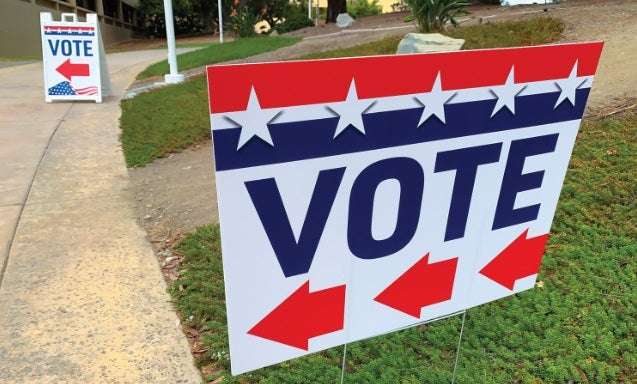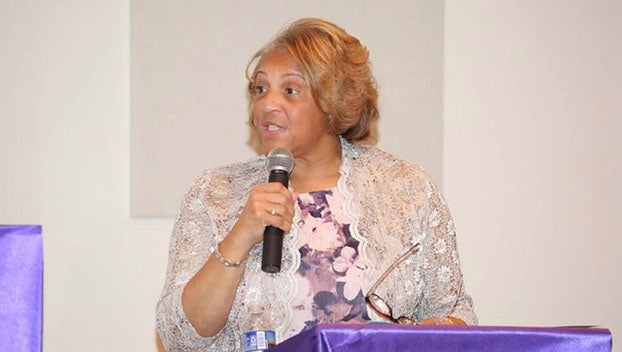Michael Fowlkes files complaint, challenging sheriff’s race results
Published 7:32 pm Tuesday, November 21, 2023
|
Getting your Trinity Audio player ready...
|
Michael Fowlkes believes the numbers don’t match. The candidate for Lunenburg County sheriff says his precinct captains came up with a different number of ballots cast than what was officially entered on Tuesday, Nov. 7. And as a result, he’s filed a complaint.
Currently, the official results show incumbent sheriff Arthur Townsend with 1,844 votes, Fowlkes with 1,812 and Ronnie Long with 139, with seven write-ins. Those numbers are what the Lunenburg County Board of Elections signed off on and sent to the state. The Virginia Department of Elections confirmed these numbers had been certified. Now once the votes have been certified that’s it, unless a complaint comes in.
“Counties certify their own results and issue certificates of election to local candidates,” said Andrea Gaines from the Virginia Department of Elections. She added that the Lunenburg County elections were all certified on Tuesday, Nov. 14. But even in this, there were a couple issues, Fowlkes said. As of Monday, Fowlkes told The Dispatch no one had contacted him to say the results had been certified or issue any certificates of election.
Why does this matter? A candidate can’t file a complaint until the results have been certified. And once they are certified, there is a limited window of time to respond.
The complaint from Michael Fowlkes
So there are multiple parts to Fowlkes’ complaint, which The Dispatch obtained a copy of. To start with, he claims the ballot numbers do not match in most of the precincts.
“In 8 out of 11 precincts, the total number given to poll captains are different from what is posted on the government website,” Fowlkes says in the complaint.
Specifically he cites these examples:
- Plymouth: 293 total was verbalized, 290 was reported to state
- Browns Store: 403 was verbalized, 402 was reported to state
- Rosebud: 202 was verbalized, 200 was reported to state
- Hounds Creek: 356 was verbalized, 350 was reported to state
- Arrowhead: 164 was verbalized, 162 was reported to state
- Reedy Creek: 217 was verbalized, 213 was reported to state
- Pleasant Grove: 243 was verbalized 249 was reported to state
- Victoria Library: 160 was verbalized, 161 was reported to state
Now there are other parts to the complaint, but they venture into legal territory, so we’ll tackle those in a minute. When a complaint is filed, the Virginia Department of Elections contacts the local Board of Elections and lets them respond. Oliver Wright from the Lunenburg Board of Elections was asked to respond in this case. He said the numbers mentioned above weren’t wrong, because they weren’t referring to the same thing.
“We found that the numbers were accurate but confusing because they represented different things,” Wright said. “The two different things that were reported were the turnout (ie. the number of people who voted and the number of ballots scanned by the voting machines) and the number of votes in each race.”
Basically, Wright said the verbalized number is the total number of people who voted at a precinct, that is the ballots cast on the machine. However, not everyone who voted picked a candidate in the sheriff’s race or some voted for more than one, which is also not counted. That’s why the numbers turned in to the state are different.
A glitch in the system
Fowlkes also raised the issue of what happened on Election Night. On Election Night, there was some confusion in the race, as state results seemed to show Fowlkes as the winner. At the time, Wright gave an interview to another media outlet in the area, saying there was a glitch in the system. He said the same thing when interviewed the next day by The Dispatch’s reporter Jeff Moore.
Wright said as they worked to input results after the polls closed, the new State Board of Elections software froze up. Wright explained this meant the numbers in the reporting system people were viewing on the state website were incomplete.
But Michael Fowlkes raised a point in his complaint. If there was a glitch in the system, “who is correcting it, how is it being corrected and is there a state representative present to make sure the process to count is being done fairly and accurately,” he wrote.
Wright responded that the voting system worked. The glitch was with the software that helped load the totals online for the state.
“We noticed that on Election Night, some of the numbers did not correspond to the numbers we were inputting and the site was not updating,” Wright said. “[We] notified (The Virginia Department of Elections) and they did an investigation and the discrepancy was corrected. We also made sure that any discrepancies were corrected the next morning.”
The system, Wright explained, was operated by a third party, who he referred to as Advanced Voting Support. In a statement they provided, however, that third party called itself Enhanced Voting Support. Speaking on behalf of his group, Paul Ray explained what the issue was on their end.
“At approximately 8:30 PM on Election Night, we experienced an issue where all Early Voting and Mailed Absentee was set to auto roll up. This caused the summary totals that had been entered to drop. We identified the issue and changed the setting back. In our research, our developers were able to restore the detailed entry that had (been) inputed prior to the change. This is why the totals appeared to fluctuate, but no data was lost and what had been input was restored,” Ray said.
So what happens now?
Now that Michael Fowlkes has filed a complaint, there are a few options open as to what happens next.
“There are no automatic recounts, but candidates can request one,” Gaines said. “Candidates may also file election contests.”
Now a recount is simple. That’s when a candidate says he or she believes there was a malfunction with the equipment or some other reason that the ballots were not counted correctly. In that case, the local board of elections would simply count the votes again, this time by hand. However, this isn’t free. The challenger asking for the recount would have to first post a bond in the amount of $10 per precinct. If the challenger wins the recount, the cost of running it would be paid by Lunenburg County. But if the challenger loses, then he has to pay.
If a candidate is contesting the election, then that gets a bit more complicated. Then it becomes a legal case and goes before the county circuit court judge.
More on contesting elections
For the rule on contesting an election, Gaines directed The Dispatch to Article 2, Section 24.2-807 of the Virginia Code. This is different from a recount in several ways. First, the candidate has to make a clear claim or accusation, pointing out a specific issue they believe happened and who was responsible. This has to be done in writing, filed with the clerk’s office of the county circuit court within 30 days of the election.
And to be clear, these accusations can’t be vague. The Code states a complaint has to include “objections to the conduct or results of the election accompanied by specific allegations which, if proven true, would have a probable impact on the outcome of the election.”
No matter what you argue, the judge will be considering if the alleged actions had “a probable impact” on the election.
This would be filed and, just like any other court case, the opposition would be notified and given their own opportunity to file a brief, arguing against it. Then a court date would be set and both sides would go before the circuit court judge. The judge can then throw the case out, order a recount or, in extreme cases, order a new election.
Michael Fowlkes faces a decision
So that is where we currently stand. A complaint has been lodged and acknowledged by the Virginia Department of Elections. Now Michael Fowlkes has to decide if he wants to request a recount or contest the election. As The Dispatch spoke to him on Tuesday, Fowlkes said he hadn’t made a decision yet.
If that changes over the next few days, we’ll have an updated story here on The Dispatch website. If not, we’ll provide an update in next week’s edition.






